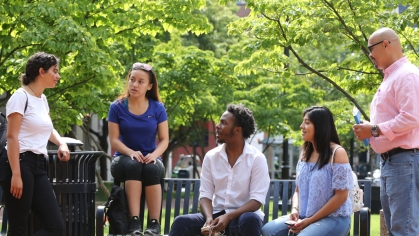Rutgers-Newark faculty, students and staff celebrated the school’s status as a Hispanic Serving Institution at an event focusing on Latinx scholarship and student experience.
Faculty discussed their research and insights, while students spoke about the freedoms and support they have found at Rutgers-Newark, the state’s number one Hispanic Serving Institution (HSI).
“I get to be myself. It means a lot for me to be in this space,’’ said student Jen Fernandez, a Finance major and president of Rutgers-Newark’s student chapter of the Association of Latino Professional for America.
The event, tied to Hispanic and Latinx Heritage Month, was sponsored by the Chancellor’s Office.
“We take great pride in our HIspanic Serving Institution Designation,’’ said Interim Chancellor Jeffrey Robinson, who introduced the event, noting that HSI’s must have a Latinx population of 25 percent and RU-N’s figures are 35 percent.“We’re attracting members of one of the fastest growing demographics in America.’’
He mentioned programs that have helped Latinx students succeed, such as the the Louis Stokes Alliance for Minority Participation (LSAMP) program, funded by the National Science Foundation, which increases STEM participation for underrepresented students; the G-Rise program, which boosts the number of underrepresented graduate students pursuing advanced STEM degrees , and the Rutgers Law School’s Minority Student Program, which turned 50 this year.
“All three have been successful in broadening participation of Latinx students in STEM and increased the presence of Latinx lawyers,’’ he said. “What makes them special is that they tap into our diverse community, a place where our Hispanic and Latinx students not only thrive academically but succeed in the workforce, in leadership and academically. When our Hispanic and Latinx students excel, all of our students excel and succeed.”
Vice Provost Luis Rivera explained the impetus behind the gathering. “One of our goals was to bring awareness of some really awesome exemplars of our campus and have a social moment, but also get to engage in discussions that we think are important.’’
During a panel on Latinx scholarship and identity, Rivera, who is a social psychologist, asked researchers about the perception that Latinx people are a monolith, which can fuel stereotypes and prevent recognition of their diversity.
Eduardo Rivera Pichardo, a postdoctoral associate in Vice Provost Rivera’s psychology lab, said that growing up in Puerto Rico, he never considered himself “Hispanic,’’ a designation he adopted when he moved to the U.S.
“We don’t use those terms. When we are asked to identify ourselves, one ever questioned it from that perspective,’’ explained Pichardo, who is researching Puerto Rican identity and views on colonialism in his homeland and the U.S. “The distinction is also distancing from Hispanic heritage within communities. When I’m asked to celebrate Hispanic Heritage I’m perplexed.”
He noted that one commonality Latinx people share, in addition to cultural expressions like food and music, is that their roots are a product of colonialism. “We are the sons and daughters of conquest,’’ he observed.
“How to reconcile this from a colonial lens is a question beyond Mexicans and Puerto Ricans having something to share. We have a lot to share, but even within the Puerto Rican community there is a multiplicity of identities,’’ he added.
Professor Natalie Munoz, an assistant professor of Social Work who identifies as Afro Latina, stressed the importance of acknowledging that, even within different Latinx cultures and nationalities, there are a range of racial, ethnic and religious groups.
The Afro Latino identity is often submerged beneath the umbrella designation of Latinx or marginalized due to racism and anti-Blackness, said Munoz. She emphasized how multifaceted Afro Latinos can be.
“Within Latinidad we are so diverse but also in Afro Latinidad we are so diverse. There are some Afro Latinos who speak Spanish, some speak French. There are Afro Latinos who are Muslum, who are Asian, in the Dominican Republic there are communities of Chinese-speaking immigrants from Asia,’’ she said.
Viewing Hispanic people as a monolith can also reinforce racist stereotypes associating them with crime and lead to blanket assumptions that Latinx people are undocumented. But the majority are citizens or have legal status, said Erica Salinas Thomas, a professor of Political Science.
“My research really touches on distinctions within the Latin community around legal status and criminalizing young people for being in street gangs. That pernicious stereotype affects how Americans view individuals that are visibly Latinate,’’ she said.
Speakers listed the advantages of having Latinix faculty and students, including Javier Castro, a professor in the Spanish & Portuguese Studies department who focuses on literature. He described why courses in his department are valuable.
“We allow students to connect to their roots,’’ he said. “What we offer is a cultivation of a particular sense of belonging, which is open to everyone of course, but is particularly meaningful to Hispanic and Latinx students.’’
Other moderators and panelists included Stephanie Gomez, acting assistant dean for the Center for Career Development at Rutgers Law School; Ricardo Andres Bello Gomez, assistant professor with the School of Public Affairs and Administration, and RU-N Community Service Officer Manuel Sosa-Garcia, assistant Director, Undocumented Student Services with the Student Affairs Division.
Additional students who also participated were Michael Acaro, a Finance major and vice president of the Inter Fraternity and Sorority Council and vice president of the Beta Delta chapter of Sigma Lambda Beta International Fraternity Incorporated.
Entertainment was provided by artist alumna Yeimy Gamez Castillo,a singer, poet, activist and co-founder of ImVisible.


